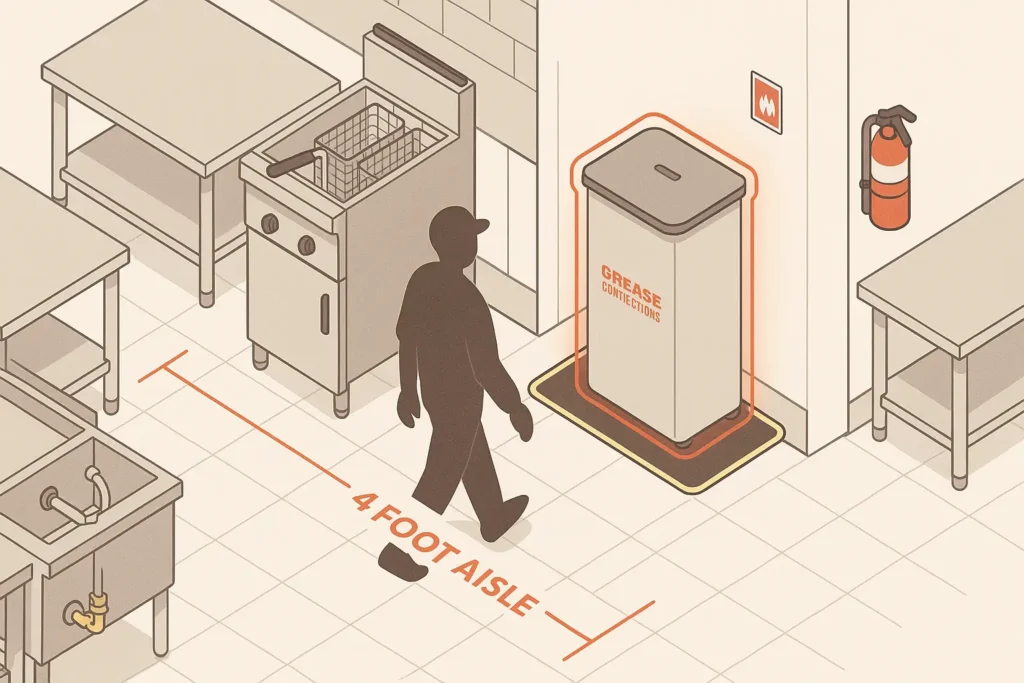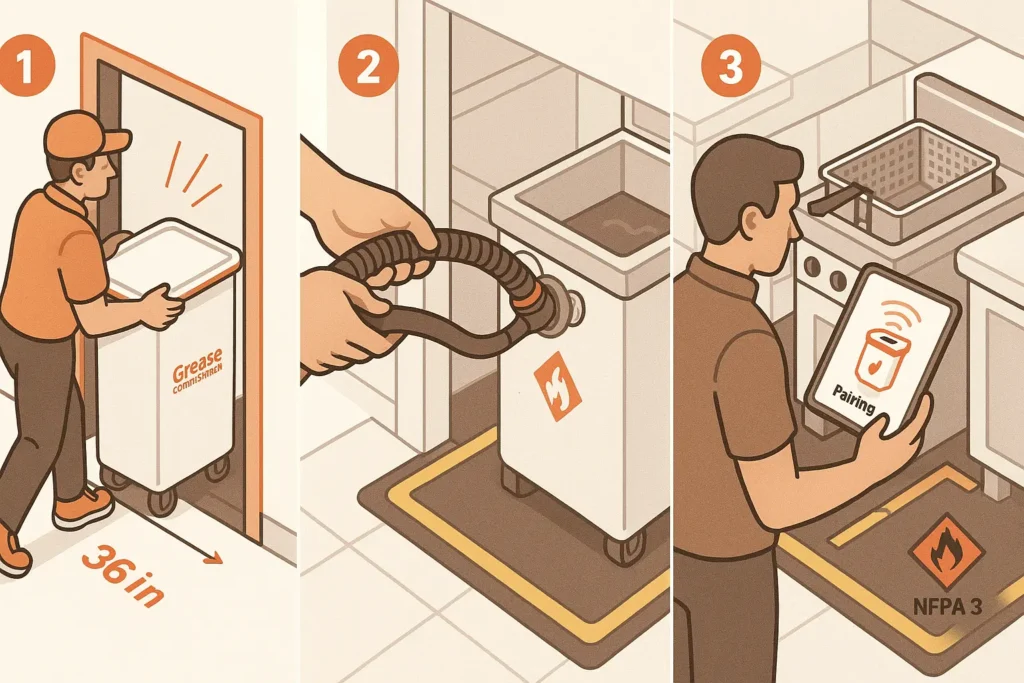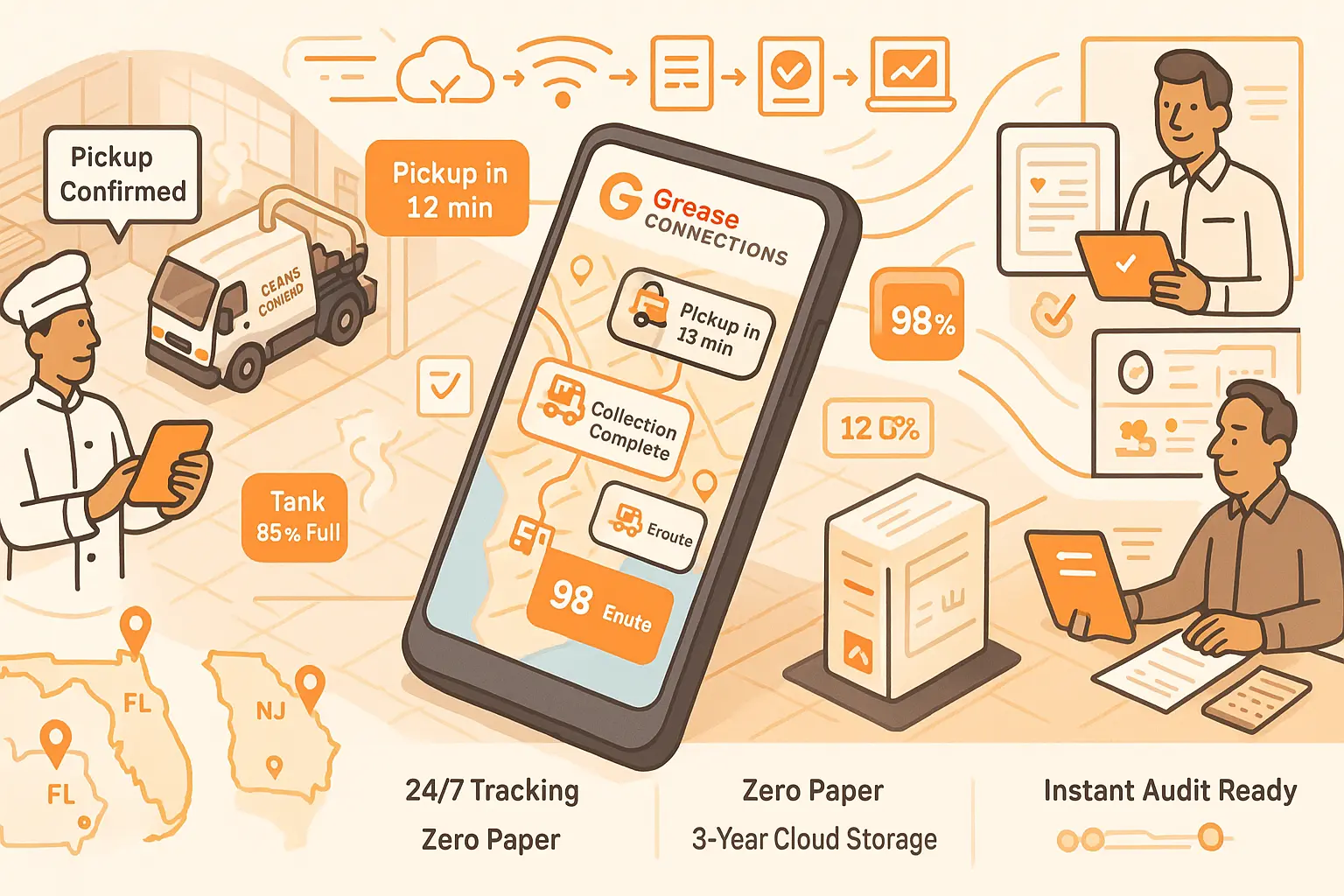Table of Contents
Space is money in a restaurant kitchen. When the fryer hums but every aisle is barely a shoe width wide, the wrong oil bin can clog workflow, trigger fines, or spark slips. This guide shows Florida, Georgia, and New Jersey restaurants how to choose slim, code compliant used oil bins that fit the tightest back of house corners backed by current regulations, safety science, and real world layouts.
Tiny Aisles, Hot Oil: Why Cramped Kitchens Need Slim Bins
Walkways under four feet wide already breach OSHA aisle guidance; toss in a rolling 300 gallon cage and staff start dodging hazards. OSHA advises aisles at least three feet wider than the biggest piece of mobile gear, or a hard minimum of four feet. An oversized bin can also block the emergency egress distances fire marshals check during surprise visits. According to the Florida DEP, oil containers must sit on impermeable flooring and stay weather tight even indoors, or they earn citations averaging $500 per day. A slim, sealed footprint keeps traffic flowing, cuts slip claims, and satisfies inspectors without sacrificing rebate revenue from your used oil collection company.

Slim Bins, Big Payoff: How Compact Containers Solve the Space Puzzle
Modern grease bins borrow ideas from stackable poly tanks used in lubrication rooms. Rotomolded walls shave thickness, while built in baffles stop oil slosh so a 70 gallon tank can stand only 22 inches deep yet stay tip stable. Optional quick connect hoses let staff drain fryers without lugging hot pots, dramatically lowering burn incidents reported in tight kitchens. Grease Connections notes that sealed indoor tanks also deter oil theft, which spiked 18 percent nationwide last year. Pair a slim bin with a level sensor and your used collection company schedules pickups automatically, eliminating overflow odors in warm Florida summers.
Florida, Georgia, New Jersey: Rules in Plain English
Florida treats used cooking oil like a recyclable, but you still need secondary containment if indoor storage exceeds 55 gallons. Georgia’s FOG rule 391 3 6 .24 makes recycling mandatory and lets counties levy fines up to $1,000 for spills over storm drains. New Jersey requires an A 901 licensed transporter and five year manifest retention; yes, inspectors ask to see them. NFPA 30, which these states reference, caps indoor combustible liquid storage rooms at 120 gallons unless they’re fire rated.
| State | Permit Trigger (Indoor Gallons) | Secondary Containment? | Special Paperwork |
|---|---|---|---|
| FL | >55 gal | Yes, oil proof pad | DEP annual form |
| GA | County specific; >60 gal common | Yes | FOG self report |
| NJ | >30 gal inside food prep area | Yes | A 901 manifests |
Pick the Right Footprint: Sizes That Actually Fit
Below is a snapshot of footprints that slide through a standard 36 inch service door measured against daily fryer output. Dimensions come from common slim tanks and 35 pound carboy boxes.
| Footprint (W×D in) | Height (in) | Capacity (gal) | Fits Fryers Using (lb/day) |
|---|---|---|---|
| 9 × 16 | 9 | 4.6 | up to 35 lb |
| 18 × 22 | 32 | 35 | 36 to 75 lb |
| 22 × 24 | 40 | 55 | 76 to 120 lb |
| 24 × 26 | 43 | 70 | 121 to 180 lb |
Step by Step: Installing a Bin When You Have Barely Any Room
First, mark a spill proof pad one inch larger than the bin on all sides; Florida DEP inspectors want proof of oil impermeable flooring. Next, wheel the empty tank through the widest kitchen door. OSHA notes you need at least four clear feet, so shift prep carts temporarily. Lock casters, connect the fryer drain hose, and purge air with a splash guard in place; NFPA 30 calls for closed transfer to limit vapors. Finally, sync the level sensor with your used collection company’s pickup dashboard so drivers know exactly when to swap.

Daily Routines That Keep Small Bins Safe and Clean
Heat accelerates rancidity, so tap the lid gasket each night; a quarter inch gap can raise peroxide values by 40 percent in 72 hours, according to University food science studies. Wipe spills with absorbent pads, never water, because oil beads into grout and triggers fruit fly blooms in coastal Florida humidity. Every Friday, scan the sensor dashboard; many slim bins reach 80 percent full in eight days when two 50 lb fryers run lunch and dinner. Schedule a pickup no later than 90 percent; NFPA 30 warns overfilled containers create head space vapors that ignite at 700 °F.
Partner with a Used Collection Company Without Losing Floor Space
Ask providers whether they swap bins or pump out on site. Swap programs need room to stage a second tank, often impossible in a back hallway. Pump outs, standard across Georgia and NJ, use a vacuum hose through the back door and keep your single slim bin in place. Confirm the driver’s hose length suits your layout; a 35 foot line reaches most Florida strip mall kitchens, sparing you curbside clutter. Finally, lock service to off hours so staff aren’t forced to step over hoses during dinner rush. Iron Mountain Refrigeration notes smooth traffic flow boosts ticket times by up to 15 percent.
Next Steps: Free Layout Check & Local Links
Ready to reclaim floor space? Grease Connections offers a no cost layout check: we map door widths, fryer drains, and code thresholds, then match a slim bin and we guarantee it clears your narrowest turn. If you’re in Miami, Atlanta, or Newark, tap our city pages for same week installs and rebate details. Swap the headache of bulky cages for a footprint that finally fits and turns waste into revenue every time the truck rolls.









